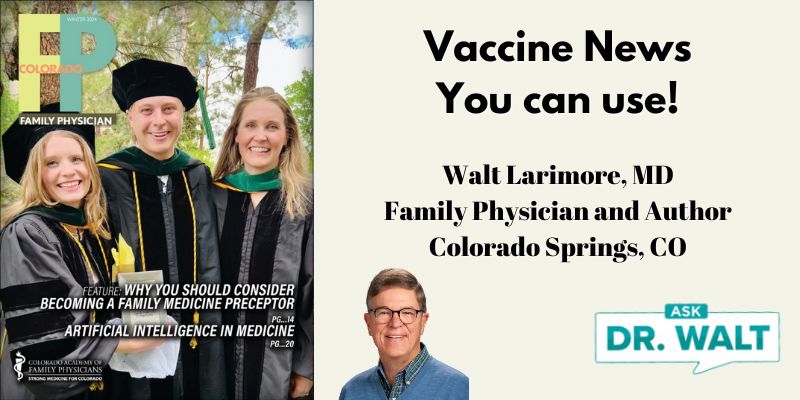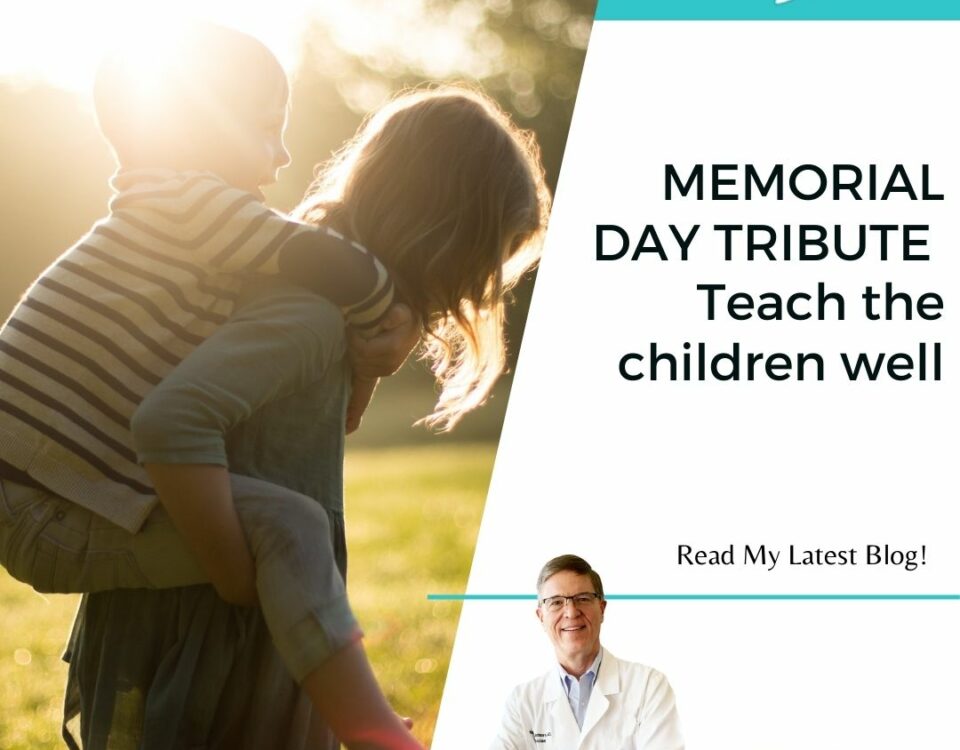
March 5, 1944 – The grim and deadly struggle for life on the beachhead of Anzio
March 5, 2024
March 6, 1944 – Farm houses and foxholes at Anzio
March 6, 2024I’ve been honored to write a quarterly column, “Vaccine News You Can Use” for the Colorado Family Physician journal for a number of years. Below is the Winter 2024 edition of CFP:
News Items:
- More than one in six toddlers not receiving all of the earliest childhood vaccines
- CDC: Childhood vaccination coverage has not rebounded
- Vaccine skepticism, belief in misinformation growing years after the COVID pandemic
- Survey highlights adults’ views on new COVID, flu, and RSV vaccines
- Flu Vaccination May Reduce Risk For Major Cardiovascular Events
- COVID vaccines prevent premature births, study shows
- Maternal COVID vaccine protects infants after birth
- CDC recommends RSV vaccine for pregnant women to protect infants
VIEW ONLINE HERE.
VIEW THE TEXT BELOW:
More than one in six toddlers not receiving all of the earliest childhood vaccines
One in six kids don’t complete their full schedule of vaccines according to a study nationwide of more than 16,000 toddlers published in the journal Pediatrics .
Why? Some families may move across state lines, while others don’t have health insurance. Black children were less likely to have completed their vaccination series, and children living in lower-income households and rented homes were up to 30% more likely to not finish their vaccine series.
CDC: Childhood vaccination coverage has not rebounded
According to an article published in the CDC’s MMWR, the percentage of kindergarteners who had received all of their state-required vaccines declined from 95% in the 2019-20 school year to 93% in the 2021-22 term and held steady at 93% in the 2022-23 school year.
Colorado is one of 12 states reporting <90%. In Colorado, only 87% had 2 doses of MMR, 5 doses of DTap, and 4 doses of polio, while only 86% had 2 doses of VAR – based upon state date from over 65,000 kindergarteners.
Colorado had only about 0.3% medical exemptions, but nonmedical exemptions rose from about 3.2% in 2021-2022 to about 4.3% in 2022-2023.
The CDC says, “Exemptions >5% limit the level of achievable vaccination coverage, which increases the risk for outbreaks of vaccine-preventable diseases.” The AAP noted, “There is a rising distrust in the health care system. Vaccine exemptions have unfortunately trended upward with it.”
Vaccine skepticism, belief in misinformation growing years after the COVID pandemic
A survey of more than 1,500 adults in the US found that a larger percentage question vaccines’ safety and efficacy now than in April 2021, and more also believe that vaccines can cause autism, cancer, flu, or COVID.
The number of Americans who think vaccines approved for use in the US are safe dropped from 77% to 71%, while those don’t think vaccines approved in the US are safe grew to 16% from 9%.
People who rely on mainstream media for news were most likely to trust public health experts, understand vaccination, and be vaccinated against COVID than people who rely on other sources for news.
“There are warning signs in these data that we ignore at our peril,” said Kathleen Hall Jamieson, director of the Annenberg Public Policy Center and director of the survey. “Growing numbers now distrust health-protecting, life-saving vaccines.”
The survey reported that
- Americans who think is it safer to get the COVID vaccine than the COVID disease declined from 75% to 63%;
- The percent who believe ivermectin is an effective treatment for COVID increased from 10% to 26%;
- Those who believe increased vaccines are why so many kids have autism these days grew from 10% to 16%;
- While 12% now believe that vaccines in general are full of toxins and harmful ingredients like antifreeze; and
- 12% believe that mRNA vaccines against COVID cause cancer.
Survey highlights adults’ views on new COVID, flu, and RSV vaccines
In a national survey, almost half of US adults said they “definitely” or “probably” will receive the updated COVID vaccine, but less than 40% plan to get it for their children, and more people plan to get flu or respiratory syncytial virus shots than COVID vaccines. The poll also showed sharp differences along political lines in the proportions of adults who plan to get the COVID vaccine.
Flu Vaccination May Reduce Risk For Major Cardiovascular Events
Influenza vaccination was linked to a 20% reduced risk for major cardiovascular events (particularly MIs) and death according to researchers who “conducted a systematic review and meta-analysis of five studies” and found that “overall, there were 517 cases of major cardiovascular events among patients who received influenza vaccination, compared with 621 cases among those who received placebo.” The researchers encouraged HCPs to “target patients with CVD for vaccination to mitigate risks.” The study was published in Scientific Reports.
COVID vaccines prevent premature births, study shows
HealthDay quoted a researcher opining that “COVID vaccines saved the lives and health of countless babies by preventing their premature births.” This was based on a study which was published in the Proceedings of the National Academy of Sciences . “COVID initially caused an alarming surge in premature birth rates, but those returned to pre-pandemic levels following the introduction of vaccines, researchers found.” Researcher Jenna Nobles added in a university press release, “These findings should help allay vaccine hesitancy among pregnant women … The results here are compelling evidence that what will actually harm the fetus is not getting vaccinated. That’s a message practitioners can share with concerned patients.”
Maternal COVID vaccine protects infants after birth
CDC research published in MMWR shows that receiving a COVID vaccine during pregnancy can pass on protection that will last during the infant’s vulnerable first months after birth. Investigators examined data from 26 pediatric hospitals and found that during the past season, maternal vaccination offered 54% effectiveness against COVID hospitalization for babies under 3 months of age.
CDC recommends RSV vaccine for pregnant women to protect infants
ACIP recommended that expectant mothers get an RSV vaccine to protect their newborns from the potentially deadly respiratory disease. The recommendation for the vaccine was for women “who are between 32 and 36 weeks pregnant and who will give birth during the fall and winter, when RSV cases usually spike,” adding that the protection “likely drops after 6 months of age, so the shot is for use between September and January in most of the US.”
CDC recommends new pentavalent meningococcal disease vaccine for teens and young adults
ACIP also recommended a new vaccine to protect teens against meningococcal disease, which “can cause hearing loss, severe neurological damage, the loss of limbs, and, in many cases, death.” Previously, there were “two types of vaccines licensed in the United States: One that targets A, C, W, and Y serotypes of meningococcal disease (Nimenrix) and another that targets the B serotype (Trumenba).” Now, “the new pentavalent vaccine (Penbraya) requires only two doses and protects against the five most common disease serotypes: A, B, C, W and Y.” The FDA approved the vaccine “for ages 10 through 25,” but ACIP voted to add the new vaccine option for people 16 through 23.”
- NASAL VACCINE NEWS
- Nasal flu vaccine is under review for self-administration (tinyurl.com/mwuyszm7)
- Intranasal COVID vaccine shows promise in early testing (tinyurl.com/2nk3nc2s)
- COVID VACCINE NEWS
- Moderna combination COVID, flu vaccine moves to final stage trial after positive data (tinyurl.com/3k4fzsj3)
- FDA approves Novavax’s updated COVID vaccine (tinyurl.com/ymkza6wp)
- Experts hopeful more Americans will begin treating COVID shots as annual vaccinations similar to the flu (tinyurl.com/294ahv22)
- Study finds COVID vaccination does not increase risk of miscarriage (tinyurl.com/mvr9529y)
- COVID vaccination can reduce risk of post-infection cardiovascular complications, researchers find (tinyurl.com/ywsux5cz)
- COVID vaccination may reduce risk of new-onset IBD (tinyurl.com/2nmht7yp)
- Co-administration of mRNA COVID vaccine and high-dose flu vaccine linked to slight risk of stroke in older adults (tinyurl.com/3dh95rkr)
- A small increase in seizure risk may occur with COVID vaccination in children ages 2 to 5 (tinyurl.com/56hsfbzp)
- COVID vaccination may play role in migraine worsening (tinyurl.com/27dhcdcv)
- MATERNAL VACCINE NEWS
- Maternal mRNA COVID vaccination during pregnancy linked to lower risk of neonatal death, other poor outcomes, study finds (tinyurl.com/ymuty7vc)
- Maternal pertussis vaccination tied to reduced risk for infection among infants through eight months of age, study indicates (tinyurl.com/2kkz37dx)
- Despite more vaccines to protect pregnant women from respiratory illnesses, fewer are getting vaccinated (tinyurl.com/ywmupwas)
- VACCINES AND MS
- Vaccines not tied to flare-ups of MS; research suggests (tinyurl.com/ydywfjdj)
- MPOX VACCINE NEWS
- CDC: Men at high risk should continue to get mpox vaccine (tinyurl.com/3tvua3e2)
- Mpox vaccine reduces severity of infection, study finds (tinyurl.com/4s5skb3u)
- HPV VACCINE
- Reminders and audits may increase HPV vaccine uptake. Learn how at tinyurl.com/yer4cm5h
- Study supports HPV vaccination for both sexes (tinyurl.com/3ay8a8yv)
ABBREVIATIONS USED:
- ACIP – Advisory Committee for Immunization Practices
- CDC – Centers for Disease Control and Prevention
- COVID – COVID-19 or SARS-CoV-2
- DTap – diphtheria toxoid, tetanus toxoid, and acellular pertussis vaccine for children <7 years old
- FDA – Food and Drug Administration
- HPV – human papillomavirus
- IBD – inflammatory bowel disease
- MMR – measles, mumps, and rubella
- MMWR – Morbidity and Mortality Weekly Report
- mRNA – messenger RNA
- MI – myocardial infarct (heart attack)
- MS – multiple sclerosis
- RNA – ribonucleic acid
- RSV – respiratory syncytial virus
- DTap – diphtheria toxoid, tetanus toxoid, and acellular pertussis vaccine for children <7 years old
- US – United States
- VAR – varicella vaccine
© Copyright WLL, INC. 2023. This blog provides healthcare tips and advice you can trust about a wide variety of general health information only and is not intended to substitute for professional medical advice, diagnosis, or treatment from your regular physician. If you are concerned about your health, take what you learn from this blog and meet with your personal doctor to discuss your concerns.




